
The Good Fat
We've all heard about the good fat and the bad fat. But what exactly is the difference? In the most simplistic terms, the good fat prevents us from forming cholesterol plaques (is not, at least diminish the risk), whereas the bad fat increases our risk of cholesterol plaques formation. Fatty acids such as omega-3 and omega-6 fatty acids are remarkable because they tremendously increase our blood level of good fats. Consequently, they are said to be "cardio-protective", as they protect the heart from any eminent stroke by decreasing the risk of cholesterol plaques formation.

How Omega-3 Fights Disease
Omega-3 fatty acids primarily help to fight ischemic diseases by decreasing the risk of cholesterol plaques formation. First of all, they reduce inflammation in the blood vessels by inhibiting a pro-inflammatory enzyme called cyclooxygenase 2 (COX 2). Inflammation which is the first step in the formation of a cholesterol plaque. They also decrease inflammation in the joints in a similar way, thus alleviating the symptoms of inflammatory joint diseases (rheumatoid arthritis, osteoarthritis, etc.). They also reduce the inflammatory response that leads to airways obstruction in asthma. Secondly, omega-3 fatty acids are thought to improve cognitive function in children. Additionally, when given to children with ADHD, they help them to remain focused. Omega-3 fatty acids can also be used as adjunct in the treatment of depression, as they increase the body levels of serotonin,
- Important notification about information and brand names used in this slideshow!
- Photo courtesy of Justin De La Ornellas by Flickr : www.flickr.com/photos/ornellas/4380079904/

Omega-3 And High Blood Pressure
Omega-3 fatty acids prevent the development of hypertension through the same mechanism. If a cholesterol plaque develops in the lumen of a blood vessel, the lumen of that vessel is narrowed, and there is less space for blood to flow. Consequently, the pressure of blood against the arteries increases, which leads to high blood pressure. Omega-3 fatty acids also contribute to the prevention of atherosclerosis-induced hypertension.
- Important notification about information and brand names used in this slideshow!
- Photo courtesy of USAG Livorno PAO by Flickr : www.flickr.com/photos/campdarby/5725377265/

Omega-3 And Heart Disease
By far, the most extensive use of omega-3 fatty acids is for the prevention of heart diseases, namely myocardial infarctions. Normally, cholesterol plaques form within blood vessels as a result of a vascular injury. First, there is inflammation of the vascular endothelium and chemotaxis of inflammatory cells (White Blood Cells). Next, platelets aggregate and form a thrombus, which is then followed by the accumulation of fat and cholesterol at the site of injury. Later on, the newly formed plaque is covered by a fibrous cap, and remains in the lumen of the blood vessel and obstruct blood flow, leading to myocardial infarction (when the plaque is formed in a coronary artery). Omega-3 fatty acids prevent the inflammation, first step in the formation of a cholesterol plaque.
- Important notification about information and brand names used in this slideshow!
- Photo courtesy of Jasleen Kaur by Flickr : www.flickr.com/photos/jasleen_kaur/4952166117/

Omega-3 And Stroke
Here again, the mechanism of action is the same as the one that takes place for the formation of a cholesterol plaque. After a cholesterol plaque has formed in the lumen of a blood vessel, it can detach and move further where it has the potential to obstruct blood flow through another vessel. When the obstruction takes place in a blood vessel located in the brain (one of the cerebral arteries for example), we refer to is as "cerebrovascular accident" or more commonly a stroke. Henceforth, omega-3 fatty acids prevent the formation of strokes by inhibiting the inflammatory process that leads to the formation of a cholesterol plaque.
- Important notification about information and brand names used in this slideshow!
- Photo courtesy of Joe Goldberg by Flickr : www.flickr.com/photos/goldberg/43951184/

Omega-3 And Depression/ ADHD
Omega-3 fatty acids can also help relieve mild cases of depression. For instance, some studies have shown that populations that consumed more fish (Iceland and Japan, just to name a few) had a lower incidence and prevalence of Seasonal Affective Disorder (SAD). It also improves the depression phase in patients suffering from Bipolar disorder. As omega-3 fatty acids are useful in relieving mild cases of depression, it can also be used for prophylaxis of the same disorder. For instance, a study conducted by the Researchers from the University of Illinois at Chicago in 2010 showed that people who are deficient in omega-3 fatty acids are more likely to experience depression than those that are not. Regarding ADHD, omega-3 fatty acids have been proven to alleviate the symptoms and improve concentration in children.
- Important notification about information and brand names used in this slideshow!
- Photo courtesy of PublicDomainPictures by Pixabay : pixabay.com/en/depressed-depression-sadness-sad-83006/
- Source 1: www.health.com/health/condition-article/0,,20188472_2,00.html

Omega-3 And Children
Omega-3 fatty acids play a huge role in brain development. As a result of that, those essential fatty acids are thought to have "brain-booster" properties in children. However, given that this claim has not yet been proven and justified scientifically, it is not an officially recognized advantage of omega-3 fatty acids. However, children are still encouraged to eat a lot of fish, except for mercury-rich fish to avoid the risk of mercury poisoning; shark, tilefish or swordfish.
- Important notification about information and brand names used in this slideshow!
- Photo courtesy of --Tico-- by Flickr : www.flickr.com/photos/tico_bassie/390745590/

The Best Source Of Omega-3 Fatty Acids
Now that we know about the wonders of omega-3 fatty acids, how can you get them in your diet? It is quite simple! Here is a list of all the main foods rich in omega-3 fatty acids: anchovies, tuna, bluefish, herring sturgeon, mackerel, grass-fed beef, wild salmon, sardines, lake trout, halibut and shrimp, just to name a few. Some of the commonly used seed oils are also great sources of omega-3 fatty acids such as canola oil, flaxseed oil, or sesame oil. Beans (especially black and red beans) are also known for being rich in omega-3 fatty acids.
- Important notification about information and brand names used in this slideshow!
- Photo courtesy of stu_spivack by Flickr : www.flickr.com/photos/stuart_spivack/3661146172/

Other Sources
In addition to the previously mentioned foods, omega-3 are also present in considerable amount in cod, tuna, soybeans, tofu, kale, collard greens, and winter squash. Herbal spices and condiments such as fresh basil, dried oregano, clove and vegetables like cauliflower, spinach and broccoli are also in omega-3 fatty acids. Different varieties of fishes (tuna, salmon, herring, mackerel, caviar, etc. are also rich in omega-3 fatty acids.
- Important notification about information and brand names used in this slideshow!
- Photo courtesy of Renée Suen 孫詩敏 by Flickr : www.flickr.com/photos/sifu_renka/3198788147/
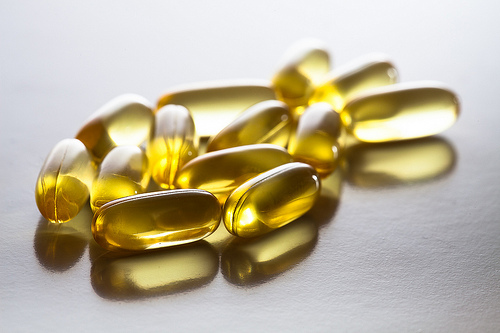
Supplements
Omega-3 fatty acids supplements are sold as gelules in pharmacies or supermarkets. They are convenient for those who travel a lot, do not have easy access to fish (and other omega-3 fatty acids rich foods) or simply those who don't like to eat fish. The recommended daily intake is 1gram per day. It is also important to note that since those gelules are made out of fish oil, you could notice a fishy taste in your mouth following consumption. In addition to Omega-3, there is also another type of good fat; Omega-6 which also has a cardio-protective effect on the heart.
- Important notification about information and brand names used in this slideshow!
- Photo courtesy of Jo Christian Oterhals by Flickr : www.flickr.com/photos/oter/6108414269/








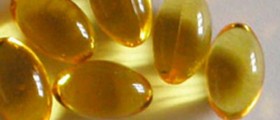




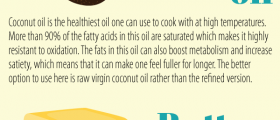

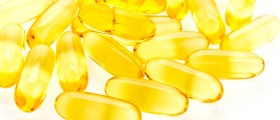



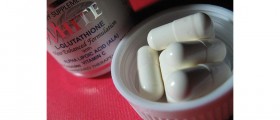







Your thoughts on this
Loading...